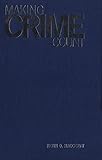Making Crime Count / Kevin D. Haggerty.
Material type: TextPublisher: Toronto : University of Toronto Press, [2001]Copyright date: ©2001Description: 1 online resource (256 p.)Content type:
TextPublisher: Toronto : University of Toronto Press, [2001]Copyright date: ©2001Description: 1 online resource (256 p.)Content type: - 9780802083487
- 9781442676893
- 353.4/3 22
- online - DeGruyter
| Item type | Current library | Call number | URL | Status | Notes | Barcode | |
|---|---|---|---|---|---|---|---|
 eBook
eBook
|
Biblioteca "Angelicum" Pont. Univ. S.Tommaso d'Aquino Nuvola online | online - DeGruyter (Browse shelf(Opens below)) | Online access | Not for loan (Accesso limitato) | Accesso per gli utenti autorizzati / Access for authorized users | (dgr)9781442676893 |
Browsing Biblioteca "Angelicum" Pont. Univ. S.Tommaso d'Aquino shelves, Shelving location: Nuvola online Close shelf browser (Hides shelf browser)

|

|

|

|

|

|

|
||
| online - DeGruyter Mackenzie King and the Prairie West / | online - DeGruyter Macroeconomic Dynamics : An Essay in Circulation Analysis, Volume 15 / | online - DeGruyter Madonna : Bawdy and Soul / | online - DeGruyter Making Crime Count / | online - DeGruyter Making Good : Law and Moral Regulation in Canada, 1867-1939. / | online - DeGruyter Making History in Twentieth-Century Quebec / | online - DeGruyter Making Sense of Sentencing / |
restricted access online access with authorization star
http://purl.org/coar/access_right/c_16ec
Official statistics are one of the most important sources of knowledge about crime and the criminal justice system. Yet, little is known about the inner workings of the institutions that produce these numbers. In this groundbreaking study, Kevin D. Haggerty sheds light on the process involved in the gathering and disseminating of crime statistics through an empirical examination of the Canadian Centre for Justice Statistics (CCJS), the branch of Statistics Canada responsible for producing data on the criminal justice system. Making Crime Count details how the availability of criminal justice statistics has fostered a distinctive approach to the governance of crime and criminal justice. What has emerged is a form of actuarial justice whereby crime is increasingly understood as a statistical probability, rather than a moral failing. At the same time, statistics render criminal justice organizations amenable to governmental strategies that aim to manage the system itself. Using contemporary work in the sociology of science as a frame, Haggerty explores the means by which the CCJS has been able to produce its statistics. The emphasis is on the extra-scientific factors involved in this process, the complex knowledge networks that must be aligned between assorted elements and institutions, and, specifically, the continual negotiations between CCJS employees and the police over how to secure data for the 'uniform crime report' survey. The conclusions accentuate the need for anyone studying governance to consider the politics and processes of governmental knowledge production.
Mode of access: Internet via World Wide Web.
In English.
Description based on online resource; title from PDF title page (publisher's Web site, viewed 01. Nov 2023)


